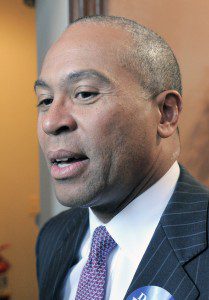STEVE LeBLANC, Associated Press
BOSTON (AP) — Legislation designed to toughen Massachusetts’ response to the state’s ongoing substance abuse troubles was among four bills signed into law by Gov. Deval Patrick on yesterday.
The flurry of bill signings came after state lawmakers ended their formal session last week. The governor has 10 days to sign or veto bills lawmakers send to his desk. Other measures, including a sweeping overhaul of the state’s gun laws, still await his signature.
The new substance abuse law requires insurers to reimburse patients for addiction treatment from licensed counselors and removes prior-authorization requirements for outpatient substance abuse treatment. Patrick said the changes will improve access to treatment for those struggling with addiction.
The law also requires chief medical examiners to report overdose deaths to the state health department and the U.S. Food and Drug Administration, making it easier for public health agencies to identify ways to reduce the risk of additional overdoses.
“Those battling the effects of addiction should never face barriers to treatment, and this law ensures that the doors of recovery are open,” Patrick said.
In March, Patrick declared a public health emergency in Massachusetts in response to what he called the state’s growing epidemic of heroin overdoses and opioid addiction.
Another bill signed by Patrick yesterday is designed to help modernize the operations and financial management of local housing authorities, while also encouraging the authorities to find ways to improve the lives of tenants.
Patrick said the new law increases oversight by strengthening the state Department of Housing and Community Development’s ability to monitor operation of the local housing authorities and to hold them accountable. The new law gives the state agency the power to appoint a chief administrative and financial officer for local housing authorities designated as “chronically poor performing” and to replace executive directors of housing authorities if needed.
Patrick said the goal of the new law is to “hold these housing authorities to the highest standards to better serve our residents.”
Patrick signed two other bills into law.
One is aimed at making what Patrick called “targeted investments” in the state’s technology infrastructure. It authorizes the state to borrow money to bring high-speed Internet to schools and underserved parts of the state, including a $38 million pilot grant program for school connectivity and $50 million for the Massachusetts Broadband Institute to develop what Patrick called “last-mile” solutions that bring broadband connectivity to more homes and businesses in western and central Massachusetts.
The new law also authorizes $200 million in spending for maintenance needs on the state’s public higher education campuses and $450 million to repair and improve state government buildings.
The other bill signed into law streamlines the licensing process for thousands of professional licensees. It eliminates the Board of Registration of Barbers and the Board of Registration of Electrologists, and creates a consolidated Board of Registration of Cosmetology and Barbering. The three boards license more than 88,000 individuals. The law also eliminates the Board of Registration of Radio and Television Technicians.
Patrick signed the bills in his newly refurbished Statehouse office.


